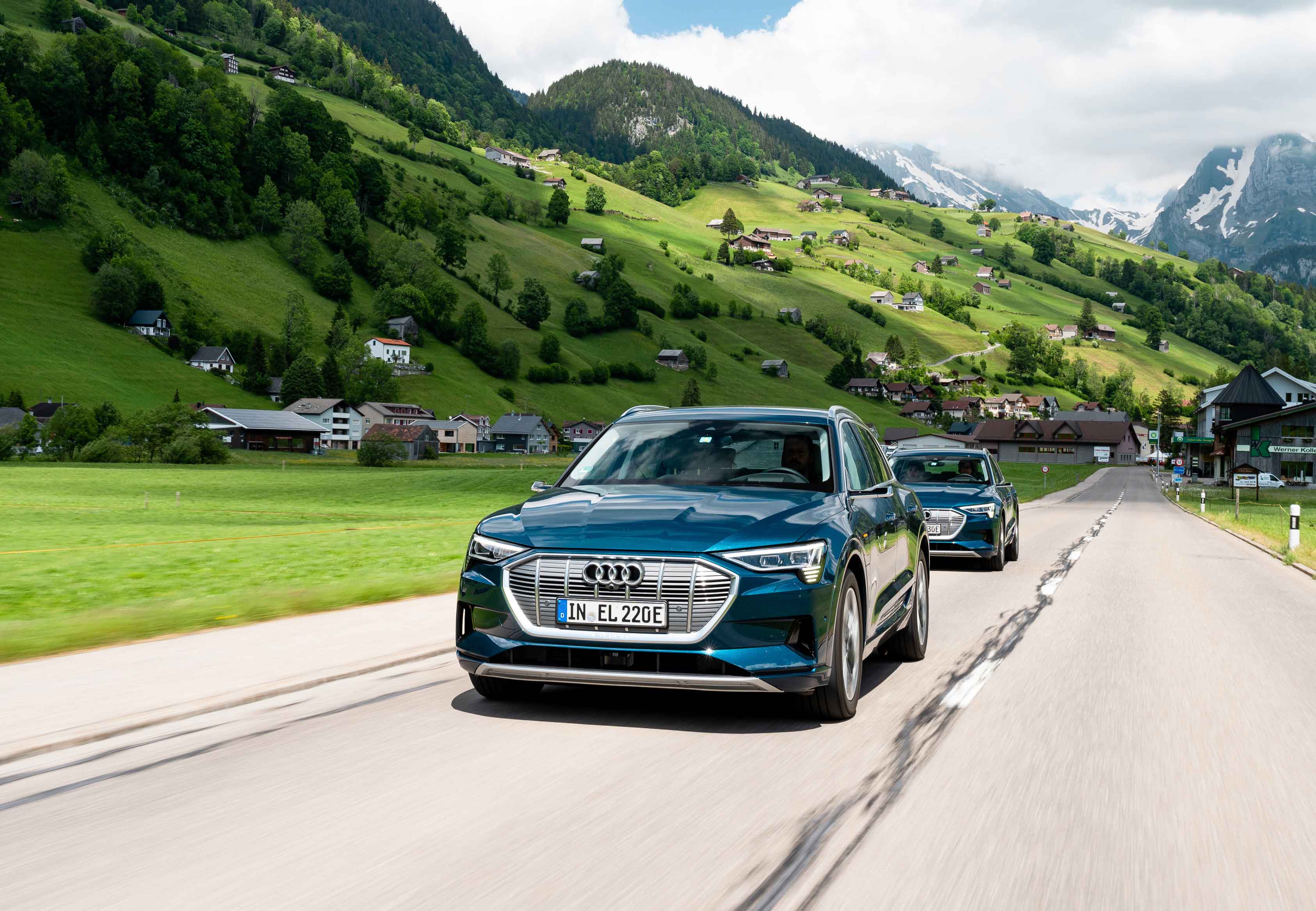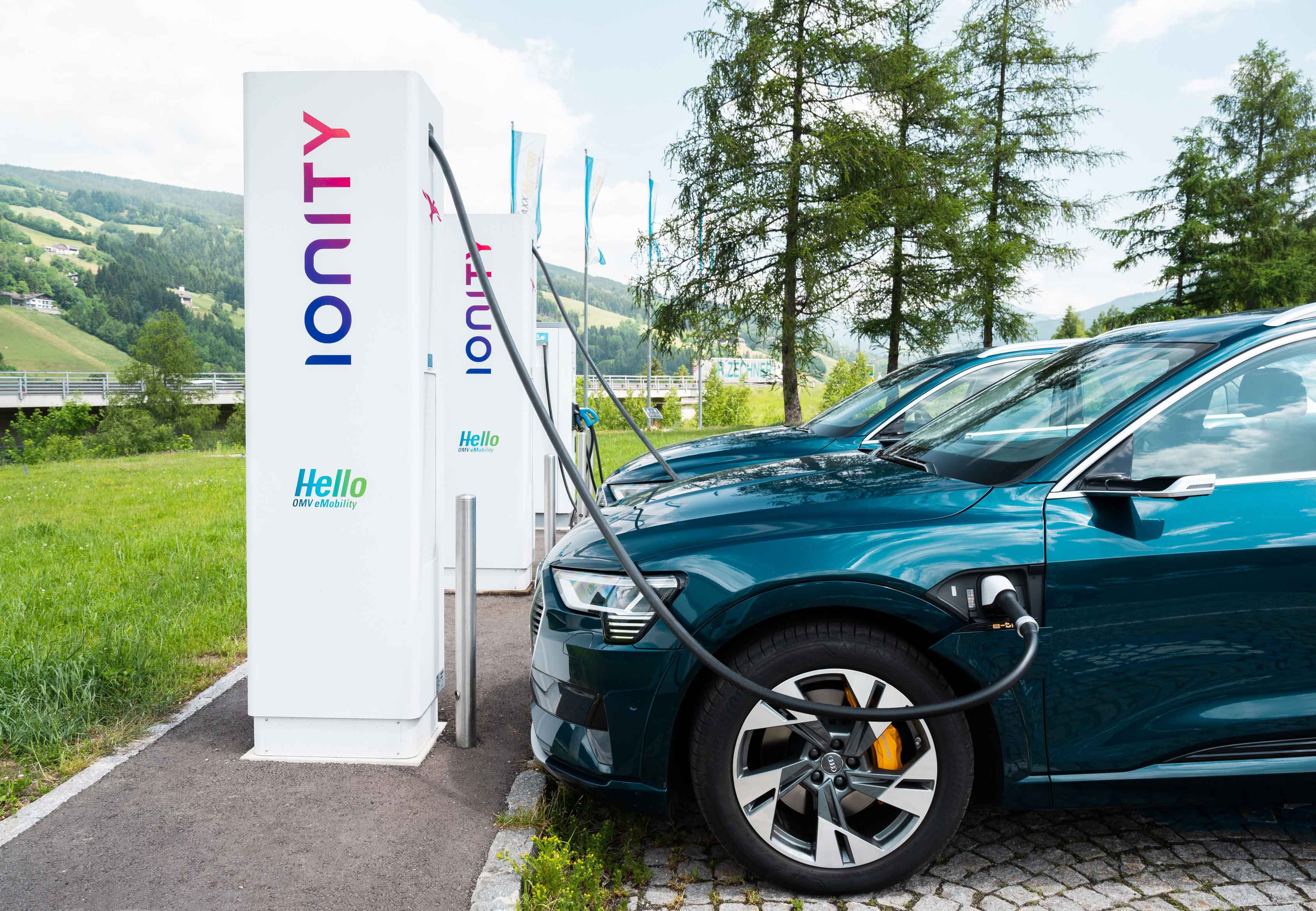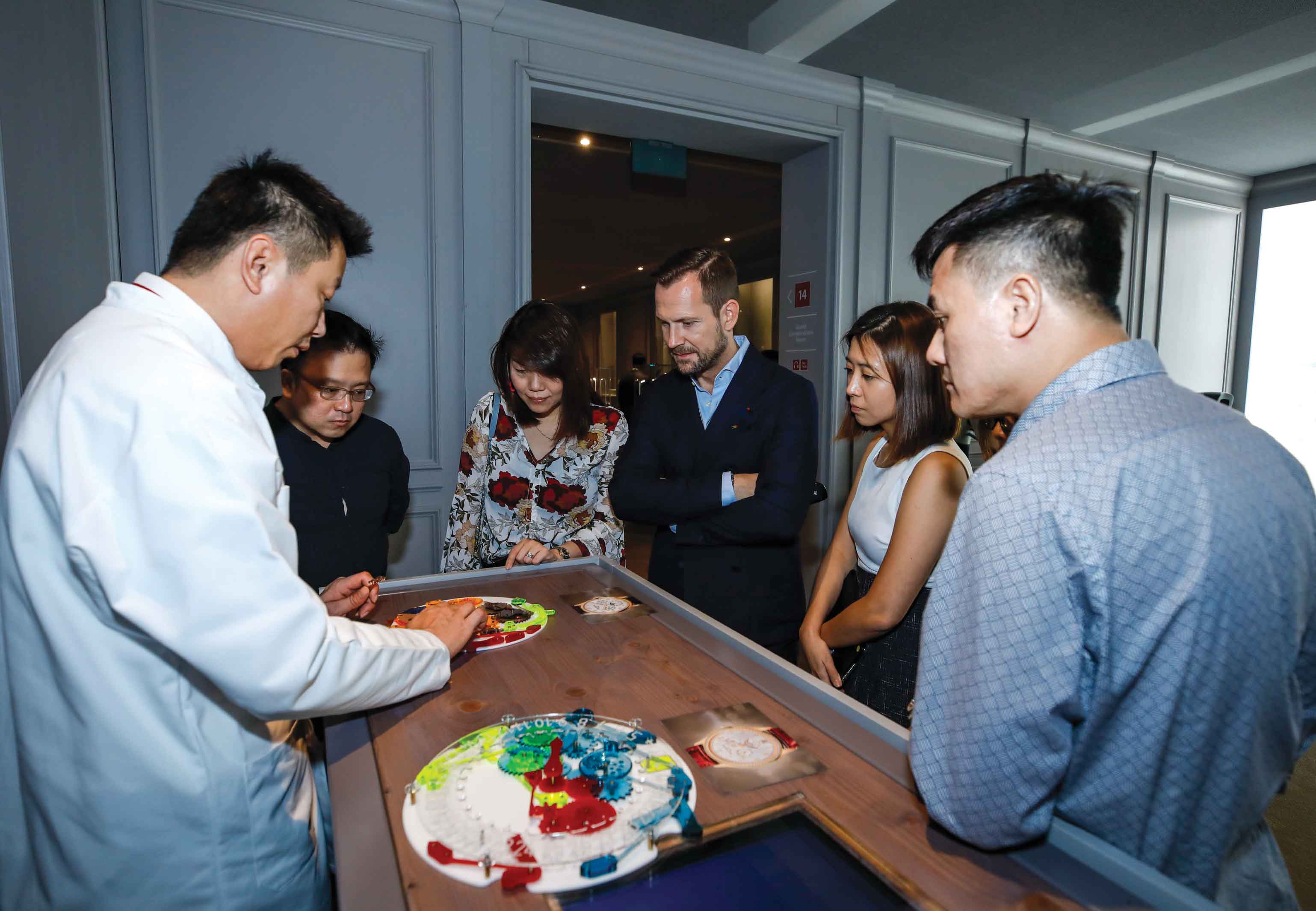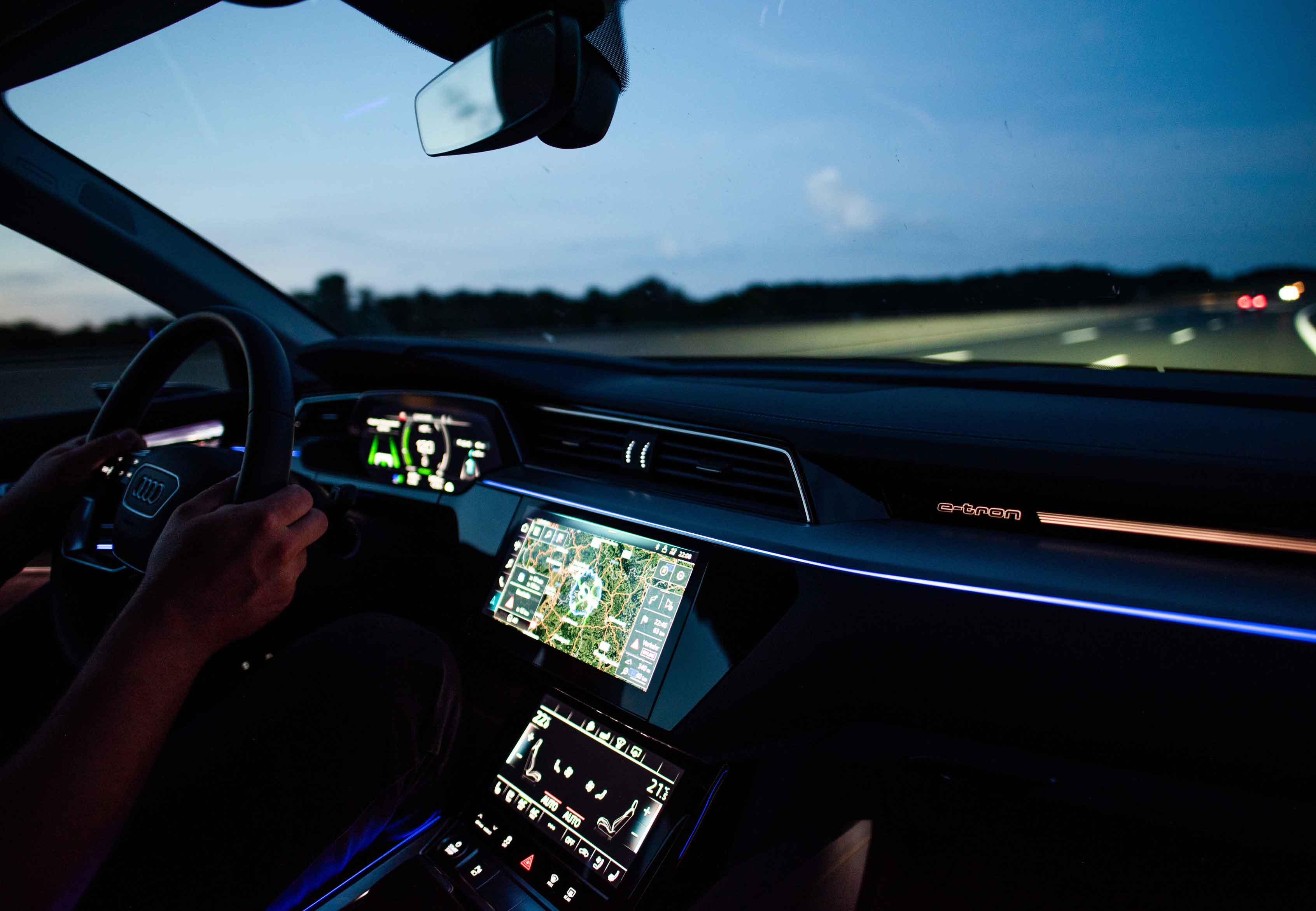Late this August, a convoy of three Audi e-tron 55 quattro departed Lake Bled in Slovenia bound for Amsterdam, and traveled 1,600km within 24 hours through Austria, Italy, Liechtenstein, Switzerland, Germany, France, Belgium and Luxembourg, across terrain that ran the gamut from the Alps to the banks of the Rhine. But instead of refueling along the way with gas, the cars recharged on direct current — the battery electric car, the first fully electric model from Audi, impressed on its European grand tour.
The full-size SUV was presented in September 2018 in San Francisco during The Charge. Powered by a lithium-ion battery, with two electric motors producing up to 300kW, it boasts a top speed of 200kmh, a range of more than 400km in the WLTP driving cycle, and no local emissions.
Though the first electric car from Audi was the A3 Sportback e-tron, a plug-in hybrid vehicle unveiled in 2014 and dropped from the lineup last year, the e-tron represents a new direction for Audi: The company plans to introduce 30 fully battery electric or hybrid models to market by 2025, accounting for a 40-percent share of sales. Since e-tron’s launch in the European market in March, nearly 10,000 e-tron cars have been delivered to customers, and Audi expects to welcome the first e-tron in Singapore by early 2020; already it has been receiving inquiries locally from existing clients and interested individuals.
The e-tron shall be the focus of Audi Singapore for 2020, says its new managing director, Mr. Markus Schuster, who assumed the role this August and oversees the markets spanning Singapore, Malaysia, the Philippines, Vietnam, New Caledonia and Tahiti. “It’s a whole shift you have in the car industry that is going towards electrification, because it’s the only way to reach those CO2 emission goals and to come to a more sustainable [model of] mobility,” he says. “Especially for Audi, we have a clear plan that we want to go electric, because in our opinion it’s the only way to really [attain] sustainability, and it’s also a big chance for us because you can reinvent the car.”

On that front, Audi is in good company: Other makes and models that have recently entered the electric-vehicle space include the Jaguar I-pace and the Porsche Taycan. But Audi’s approach is distinguished by its focus on delivering the complete Audi experience, from hardware — “all the Audi technology and brand properties in an electric car,” Mr. Schuster says — to software, such as the client engagement and services offered.
“It’s important to think further than just the product, just the car,” he adds. “It’s important to be close to our customers and take them on that journey towards electrification, and I’m confident that’s something other brands cannot offer as we can in Singapore.”
Among the offerings is the charging-on-demand service to be introduced when the e-tron arrives in Singapore: The e-tron cars will be picked up and charged by the dealership during the day while their owners are at work and returned to their original locations once charging is complete. The idea was inspired by the experience of e-tron users in markets in which the e-tron has been launched.
“What we found…is that the most important thing for our customers is that they have absolute convenience,” Mr. Schuster says. “They want to enjoy driving and owning the car, and through something like charging on demand, you can make this electric experience for the customer a positive one.”

The company’s strategy of progressively introducing electrified models to the range will soon see the addition of the new mild-hybrid RS 6 Avant and RS 7 Sportback. On top of launching 30 fully battery electric or hybrid models by 2025, Audi has made its Brussels plant, where the e-tron is produced, carbon neutral by switching to solar energy and biogas. The company aims to reduce the carbon footprint of its vehicle fleet across the entire life cycle by 30 percent compared to 2015 levels, and achieve carbon neutrality across all production by 2050.
The efforts towards sustainable electric mobility — outlined in the company’s Roadmap E — also include being part of Ionity, the fast-charging network founded in 2017 by the Volkswagen Group with brands such as BMW and Daimler that will, by 2020, comprise 400 high-power charging stations spread across 25 European countries. And as part of the Volkswagen Group, which is composed of marques including Bentley, Porsche, Lamborghini and Seat, Audi is expanding its suite of full-electric or hybrid offerings by leveraging synergies among the group’s brands to build upon flexible vehicle architectures, such as the Premium Platform Electric, developed in cooperation with Porsche for large electric cars; and the MEB (modular electrification platform), designed for smaller models. This move results in an electrified platform for all the different car segments, a strategy to improve efficiency in the large-scale production of future electric models within the group.
The long-term strategic goal for Audi is to offer CO2-neutral mobility, and the technology employed to reach that goal will be the focus of technical development in the coming years, Mr. Schuster says. Rethinking mobility, he adds, will take the coalescence of private car ownership and public transportation and everything in between, such as Audi on demand, a rental service in Singapore through which users can hire a car for anywhere from four hours to a month.
“Mobility drives the economy and societies, but you will have all kinds of mobility that are interlocked,” he says. “We have to [move away from thinking in terms of] those categories — you either own, drive or use a car, or not at all — as people in the future will do what is most convenient for them in a certain moment, and that’s where we have to get to, so that we offer the best mobility solution for people.”
- NEW PERSPECTIVES
- WINDS OF CHANGE
New Perspectives
Having spent 12 years involved in business development and product management in Audi in Germany and five years in product marketing and used car sales with Audi Italia has provided
Mr. Schuster a particular vantage point to glean insights into the unique nature of the Singapore car market. For one, compared to Germany, where car ownership is commonplace and even taken for granted sometimes, Singapore is home to consumers who largely consider cars luxury and prestige products. “That’s one reason why mobility concepts in Europe are not as well-developed as they are in Singapore, where they are embraced much more by people,” he explains.
And the smaller market size in Singapore results in the formation of a more close-knit community of Audi car owners. This is characterized by a more personal style of client engagement, augmented by initiatives such as myAudiworld, the customer privilege program that offers access to events from entertainment to gastronomy, to an exclusive reception and private tour of the Patek Philippe Watch Art Grand Exhibition held at the Marina Bay Sands last month.
“We try to create this community, to be close to the customers: On the one hand, it’s a great opportunity just to chat and stay in touch with them, but on the other hand, it’s also great for us because we always get direct feedback from our customers,” Mr. Schuster explains. “And we can relay this feedback to the headquarters in Germany, so it can improve the products.”
 Mr. Markus Schuster, along with some myAudiworld customers, on a private tour at the Patek Philippe Watch Grand Art Exhibition.
Mr. Markus Schuster, along with some myAudiworld customers, on a private tour at the Patek Philippe Watch Grand Art Exhibition.
Over his 17 years with Audi, Mr. Schuster has observed seismic shifts transform the car industry, from the rising emphasis on sustainability to the increasing variety in product range. “When I started working for Audi, we didn’t offer any SUVs, and now we have six,” he says. “The variety of models has grown incredibly over the years, and that is a challenge for the carmakers because you have to find the right balance between product complexity, which is a cost factor, and having the most attractive product offering for customers.”
Furthermore, the energetic pace of digitalization has impacted the car industry too. With consumer electronics being launched at a rising frequency, users get into the habit of upgrading their devices at a speed to match. In a similar vein, the life cycle of a car used to be seven to eight years, according to Mr. Schuster, but running the same model for that duration “is something you cannot do anymore nowadays…after three or four years, you might have to introduce a new multimedia system in the car because that’s what consumers expect.”
“Technical development in society is always getting faster — it’s not a linear development,” he continues. “And as a company, we have to keep up with that and actively push that development, and that’s what keeps us moving: We want to be the most progressive brand.”
 The dashboard of the Audi e-tron
The dashboard of the Audi e-tron
- NEW PERSPECTIVES
- WINDS OF CHANGE
Winds of Change
A native of Erfurt, Thuringia, in eastern Germany, Mr. Schuster recalls cars being highly prized during his childhood: In the German Democratic Republic’s planned economy, supply and demand were often mismatched, so it could take 12 to 14 years for a car buyer to receive his purchase. Mr. Schuster recounts going on holiday with his parents and sitting in the backseat of the family Lada, and sleeping in the car during camping trips.
“The car always held a certain fascination,” he adds. The psychology and business administration graduate landed a market research internship with Porsche during his studies, and from that point on, “there was no question about whether I wanted to go somewhere else, or work with cars and in the car industry,” he says.
“When I was growing up in East Germany, it was a different system, and seeing the [Berlin] Wall come down and the transformation that Germany went through, that takes away the fear of change — it shows you that in every change there is a huge chance of building and experiencing something new, and to embrace that and see it as a positive thing,” Mr. Schuster explains. “This [movement toward] electric mobility, for example, you could say it’s a threat or dangerous for the car industry, but you can also see it as a great opportunity for the future, and that’s the way I see it.
“Cars are super emotional products, and there’s always something new to discover working in the car industry, especially now with all these transformation processes,” he adds. “That’s what’s great about working in the car industry: You can really shape the future and see step by step how the whole industry is transforming and developing.”








 Mr. Markus Schuster, along with some myAudiworld customers, on a private tour at the Patek Philippe Watch Grand Art Exhibition.
Mr. Markus Schuster, along with some myAudiworld customers, on a private tour at the Patek Philippe Watch Grand Art Exhibition.
 The dashboard of the Audi e-tron
The dashboard of the Audi e-tron




 Back
Back